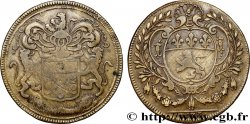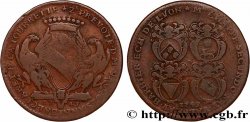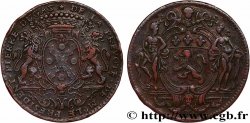Лицевая сторона
Аверс: легенда: .NOBLE. FRAN. DVFOVRNEL. SG. DV. BREVIL. P. ECHEVIN. DE. L. V. D. LYON.
Аверс: описание: Écu ovale aux armes de François Dufournel, placé sur un cartouche, timbré d’un casque taré de face, orné de lambrequins et ayant pour cimier trois plumes d’autruche.
Обратная сторона
Реверс: Описание: Écusson ovale aux armes de la Ville, placé sur un cartouche que soutient une console et qui a pour tenants les figures allégoriques nues et debout du Rhône et de la Saône laissant échapper l’eau de leurs urnes.
Комментарий
Историческая справка
LYONNAIS - CONSULATE OF LYON
The series of consular tokens of the city of Lyon dates back to 1624, when for the first time, tokens were distributed as a present of honor to members, officers and characters whose merits the Consulate had to reward.. The first distributions are intermittent and they do not become regular until 1652 when the rule of distribution of silver tokens at the end of the two years of each provost seems to have been adopted.. Honorary testimony more than a remuneration, these tokens were for the consuls (also called aldermen) a souvenir of their office and the opportunity to represent their coat of arms. On the other hand, for the secondary characters, the tokens served as a bonus and they often preferred to be paid in cash.. For great characters like the steward or the archbishops, the tokens were accumulated and enriched the family silverware. The number of scholarship recipients, fixed at nine in 1652, continues to increase and from 900 tokens, the distributions reach 4. 400 tokens in 1745. The copper tokens intended for the employees of the Consulate are minted in an uncertain number. The engraving of these tokens is most of the time the work of the engraver of the Monnaie de Lyon, for example Clair I Jacquemin or Aimé Jacquemin, while their manufacture is entrusted to the Monnaie des Médailles which has the exclusive privilege of minting from from 1672. Many studies relate to the series of consular tokens, the most recent and best documented is that of Jean Tricou, Les tokens consulaires de Lyon, Paris, Bourgey, 1955.










 Cообщить об ошибке
Cообщить об ошибке Распечатать страницу
Распечатать страницу Отправить мой выбор
Отправить мой выбор Задать вопрос
Задать вопрос Consign / sell
Consign / sell
 Информация
Информация










